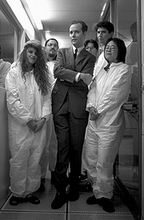
So, here I am. At L’abri. It was a good, easy trip over but I am pretty exhausted.
On the plane over, my mind was full, reeling as I fell in and out of that restless plane sleep. During the past few weeks, I have had several enlightening, disturbing, challenging, hard, beautiful conversations with friends (both new and old) about some of the most difficult questions concerning faith. The timing of these conversations is quite striking--although these conversations about struggles, doubts, belief, etc. have contained themes that have been near to my recent spiritual life, have reflected the language of my own recent soul, I feel as if my own questions have been clarified, my appetite for a deeper understanding of the reality of mystery has been whetted.
Because of this, I could not help but read Pascal’s Pensees on the plane--I felt madly driven to do it. Blaise Pascal and Simone Weil have been left some of the deepest imprints on my heart and mind over the last few months. And it keeps happening, especially with Pascal.
Please read this amazing section from Pensees:
“We never keep to the present. We recall the past; we anticipate the future as if we found it too slow in coming and were trying to hurry it up, or we recall the past as if to stay its too rapid flight. We are so unwise that we wander about in times that do not belong to us, and do not think of the only one that does, so vain that we dream of times that are not and blindly flee the only one that is. The fact is that the present usually hurts. We thrust it out of sight because it distresses us, and if we find it enjoyable, we are sorry to see it slip away. We try to give it the support of the future, and think how we are going to arrange things over which have no control for a time we can never be sure of reaching.
Let each of us examine his thoughts; he will find them wholly concerned with the past or the future. We almost never think of the present, and if we do think of it, it is only to see what light it throws on our plans for the future. The present is never our end. The past and present are our means, the future alone our end. Thus we never actually live, but hope to live, and since we are always planning how to be happy, it is inevitable that we should never be so.”
After reading this beautiful passage, I remembered one of my favorite L’abri lectures entitled
“The Sacrament of the Present Moment” by Andrew Fellows. Andrew argues along the same lines as Pascal, but continually makes the point that we meet God only in the present. How does this relate to Pascal‘s comment about the pain of the present? It is so hard, so frightening, to slow down--to wait, to believe in the sacred nature of the present moment. We are always running forwards and backwards--is this running into the future or back into the past another way to avoid God, to be distracted, to avoid facing the painful light of reality? Why? There is a lot I could say about this but this is already crazily long. Would love to hear any of your comments.
On a lighter note, here are two items of interest from my return to England:
1) Victoria Station now has its own Krispy Kreme.
2) I am sharing a little Victorian schoolhouse at L’abri with a Brazilian family. One of the Brazilians gave a lecture on Kierkegaard last night--which I sadly missed.
That’s all for now!























8 comments:
i like your blog. great sunday morning reading. you've challenged me to take a close look at pensees.
-sienna's dad
In Walden, near the conclusion of "Where I lived, What I Lived For," Thoreau says something similar to what Fellows says:
Men esteem truth remote, in the outskirts of the system, behind the farthest star, before Adam and after the last man. In eternity there is indeed something true and sublime. But all these times and places and occasions are now and here. God himself culminates in the present moment, and will never be more divine in the lapse of all the ages. And we are able to apprehend at all what is sublime and noble only by the perpetual instilling and drenching of the reality which surrounds us.
Safe travels this summer.
man, this is so incredibly true. normally when people put excerpts on their blog I am very tempted to merely skim over them... but this one had me at the first sentence. I'm in that right now... discontent with where I am and im looking to the next thing that will happen in two weeks.
this part convicted me... "We are so unwise that we wander about in times that do not belong to us."
thank you for posting words that each of us, 'specially this girl, would do well to heed.
I have to agree with Sienna, we are so often engaged in unwise wanderings around times that don't belong to us. Futile speculations. I'm not nostalgic (although I'm not imune to an irrational 'I can fix the past' mentality). What I really relate to is a hunger for the future, particularly knowledge of the future, that God, in his wisdom has decided is not for now. It reminds me of words that I was going over in my head as I desparatly tried to put the future to bed and sleep some nights ago. They sent me to sleep, have a fresh and meditative read, matthew 6:25ff. Wonder at God's attentiveness to those who surrender to him in the present, contemplate what we miss when we try to live tomorrow today, imagine the glory we give God in the process. I long to be more convinced of this arguement!!
I'm leaving this comment so you really believe I read your blog!
Fortunately, Krispy Kreme's are scattered around London now in case you need to satisfy a craving for the southern delicacy. But don't, because you will get headaches. =)
Christine
Hi Mary
I’ve been meaning to read you blog all week and now I am really glad I did. I can really relate to the post. I found it really challenging and I think God has been prompting me in this direction too. To be still and know he is Lord To come to him in quietness and consider his ways in the here and now.
Looking forward to seeing my short haired American Mary.
Lisa x
Well put, Mary.
I often must return to this simple, impossible truth. It is human to place our illusions of happiness into the future, or in our distorted memory. Often the future holds our unhappiness as well: the things which may go wrong.
Buddhism, like Christianity [probably all religious traditions have this truth somewhere], requires present-mindedness. This is the essence of Buddhist meditation. To remove the abstractions of our mind. To place us firmly in one concrete thing of the present. This must be our goal if we hope to know peace in some partial way in this life.
And the danger, for those who believe in the afterlife, is to not place all vision of peace into the future life. To realize that religious truth must be true now, if it is to be true later. This truth must bear the fruit of peace, or it will wither, and is false.
Nice post, and it inevitably sent me scurrying to C.S. After some rummaging I found the passage I'd remembered, in which Screwtape says:
"The humans live in time, but our Enemy destines them to eternity. he therefore, I believe, wants them to attend chiefly to two things, to eternity itself and to that point of time which they call the Present. For the Present is the point at which time touches eternity. Of the present moment, and of it only, humans have an experience analogous to the experience which our Enemy has of reality as a whole; in it alone freedom and actuality are offered them. [ . . ]
"Our business is to get them away from the eternal and from the Present. With this in view, we sometimes tempt a human (say a widow or a scholar) to live in the Past. But this is of limited value, for they have some real knowledge of the Past and it has a determinate nature and, to that extent, resembles eternity. It is far better to make them live in the Future. Biological necessity makes all their passions point in that direction already, so that thought about the Future inflames hope and fear. Also, it is unknown to them, so that in making them think about it we make them think of unrealities. In a word, the Future is, of all things the thing _least like_ eternity. [ . . ] Hence, nearly all vices are rooted in the Future. Gratitude looks to the Past and love to the Present; fear, avarice, lust, and ambition look ahead [ . . . ]
Post a Comment